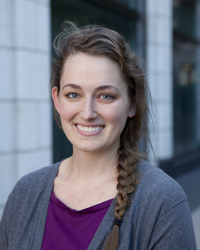
Innovative USF Students Transition Easily into Workforce

Graduation is an exciting time for students to celebrate their academic achievements, and signifies a pivotal step in their career development. The 2014 graduating class of the Master of Science in Analytics (MSAN) program at the University of San Francisco transitioned easily into the workforce. Just 89 days after graduation, the MSAN students reached 100% employment. Congratulations!
In this innovative, year-long program, the M.S. in Analytics teaches students how to develop the techniques and processes for data-driven decision making. Students explore a wide variety of topics such as statistical models, data visualization, business communication, and management science. Besides the coursework, the MSAN program offers students like Rachel Smith, ’14, the opportunity to explore technical and entrepreneurial companies outside of the classroom.
“This program offers something few schools can: San Francisco,” said Smith, who is working as a Data Analyst at Dictionary.com. “The proximity to tech giants and the entrepreneurial vibe of SF are important assets to any aspiring data scientist.”
While the MSAN program places students in a prime location, other students, like Conor O’Sullivan, ‘14, point to their involvement in the Practicum program as the stepping stone for their success in the field. Students in the Practicum program are paired with some of the most successful companies in the Bay Area to provide them with practical experience and a wider context of what it’s like to work in technical companies.

“Students get to rub elbows with some of the most renowned data scientists through the numerous Practicum opportunities and guest lectures. The Practicums allow students to learn cutting-edge techniques while boosting resumes and greatly improving their job market outlook,” said O’Sullivan, who is now a Data Analyst at Jawbone.
Practicums are more involved than the typical internship where students may embark on coffee runs for fellow employees or make copies. Practicum positions provide students with instructional employment, personal mentorship and the opportunity to practice and connect the material they learn in the classroom into a real world environment.
“We aim to cater to the industry demands for tomorrow, not today,” said Jeff Hamrick, USF MSAN Professor and Vice Provost for Institutional Budget, Planning, and Effectiveness. “During practicums, our students work one-on-one with mentors on business problems with data-driven solutions. We’re looking for active interaction during these experiences.” For example, Hamrick spoke of how one student who worked at Autogrid, a data analyst company for energy, helped forecast energy use and peak power events for consumers.
Many students stay with their companies throughout the MSAN program and beyond. Of the 23 students in the class of 2014, 19 students stayed in the Bay Area, two work in New York, one works in Virginia, and another student moved to work in Japan. Currently, the class of 2014 works at a wide variety of companies such as AIG International, Wells Fargo, Williams-Sonoma, and Qure Healthcare. Andreas Guenther, an employer at Xoom, stated that the students in the MSAN program hold a certain energy and an in-depth knowledge of the data field that establishes them as marketable employees.
"If you want to innovate and advance in big data analytics,” Guenther said, “you need bright, skilled, and adventurous human beings. The USF M.S. in Analytics program achieves just that.”